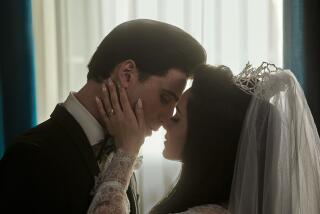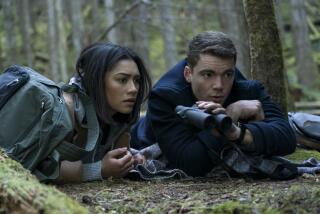MOVIE REVIEW : Jarmusch’s ‘Mystery Train’ a Complex, Minimalist Jewel
- Share via
The great American originals, from Poor Richard and his Almanack to Little Richard and “Tutti Frutti,” often show a genius for mixing up the mundane with the spiritual, the everyday with the ecstatic. That’s Jim Jarmusch’s strategy in his beautiful new movie, “Mystery Train” (at the Nuart), one of the year’s best. It’s a jewel-like, minimalist film about a group of crisscrossing wanderers and outlaws on one lyrically strange day and night in Memphis--where haphazard-seeming events slowly merge into entrancingly complex figures and patterns.
Three times, in separate but interlocking tales, we pass through the same time period and streets, with characters who rarely meet but whose destinies intertwine like overdubbed tracks in a blues record. Always, in our triple voyage through the end of the night to dawn, we seem on the brink of a revelation, a peek at the inner workings of some incomprehensible machine. Perhaps it’s a Swiss watch, ticking toward doom. Perhaps it’s a mystery train tunneling through to Graceland with a weird cargo of coincidence, careless love and Memphis blues.
For the record:
12:00 a.m. Dec. 22, 1989 For the Record
Los Angeles Times Friday December 22, 1989 Home Edition Calendar Part F Page 18 Column 1 Entertainment Desk 1 inches; 19 words Type of Material: Correction
Wrong Actress--Elizabeth Bracco co-stars in “Mystery Train.” She was misidentified in Wednesday’s review of the Jim Jarmusch movie.
The movie’s crossroads is the Arcade Hotel, a dingy, other-side-of-the-tracks establishment filled with gauche oil paintings of Elvis, manned by a huge, somnolent night clerk in an electric red suit (Screamin’ Jay Hawkins) and his half-pint butt of a bellboy (Cinque Lee, Spike’s younger brother).
Through its doors pass in succession Mitzuko and Jun, a barely bilingual and feuding Japanese couple (Youki Kudoh and Masatoshi Nagase); a rich Italian widow, Luisa (Nicoletta Braschi) and a speed-rapping transplanted New Jerseyite, DeeDee (Lorraine Bracco), bunking together by chance; and three gassed fugitives, on the lam from a jam. The latter include Dee Dee’s brother, Charlie (Steve Buscemi), her jilted boyfriend, Johnny (Joe Strummer), and their running buddy, Will (Rick Aviles).
None of these three roomfuls--down the hall from each other in rooms 27, 25 and 22--are aware of each other’s presence, though they’re linked by the same recurring moments: a radio rendition of Elvis’ plaintive “Blue Moon,” an early morning gunshot. But their stories, haunting in isolation, explode with new meanings when they’re juxtaposed.
Graceland and the quasi-religious myth of Elvis are the touchstones of this “Train,” which was partially inspired by Chaucer’s “The Canterbury Tales”; Jarmusch shows us Memphis’ own Chaucer Street to gently reinforce the point. But Jarmusch, like his great cinematic teachers, Nicholas Ray and Wim Wenders, is more a poet of isolation than of community. In “Mystery Train,” as in his masterpiece, “Stranger Than Paradise,” he’s making melancholy comic riffs on Virginia Woolf’s theme: “Disparate are we.” Friendship and love both seem founded on illusion.
The joyless liaison of the Japanese couple--enthusiastic Mitzuko and grumpy Jun, who disagree about everything, including Elvis’ superiority over Carl Perkins--is echoed in the mismatch of Dee Dee and Johnny. The three fugitive buddies are united only by desperation and false family bonds. And generous Luisa is tricked by everyone around her, from DeeDee to a glib news vendor (Sy Richardson) to the sleazy hustler (Tom Noonan) who tells her about Elvis’ hitchhiking ghost and then tries to sell her the King’s alleged comb.
All this might seem to imply a deeply misanthropic view, but Jarmusch doesn’t glory in his characters’ disunions. His comedy, painfully hip, is also full of compassion. Perhaps no one since Harold Pinter has been as effective at creating conversations between people basically talking to themselves, but just because Jarmusch shows so many missed connections doesn’t mean he banishes the possibility. Even the movie’s most catastrophic act, the one that makes outlaws of the three buddies, stems from a generous, though insanely exaggerated, impulse.
Its cruelest act happens so offhandedly many may miss it. Callous Jun explains that he’s photographing the hotel fixtures because he only records what he knows he’ll forget; immediately afterward, he snaps a shot of his radiant little girlfriend, who stares at him uncomprehendingly.
Together with cinematographer Robby Muller, shooting in color this time, Jarmusch makes sure we’ll never forget Memphis. With his trademark sideways traveling car shots, he catches eerie blues hanging over distant housing projects or neon rhinestone patterns in dusky windows. John Lurie contributes a piercing Sun Studio-style guitar score and the cast makes a near-perfect ensemble. If anyone deserves to be singled out, it may be the effulgent Kudoh (star of the Japanese dark comedy “The Crazy Family”) or night clerk Hawkins, for his great slow-burn comeback to a fast-food commercial for the vile-sounding “Jiffy Squid.”
There’s something sad and sweet, fragile and strong, about “Mystery Train,” luminous as pearl, dark and deep as night. It shows us America through a kind of triple screen; it’s hard to believe Jarmusch isn’t at least subconsciously uniting his triple stylistic influences of Japanese and European cinema and American “outlaw” movies. And, like Norman Mailer, he is fascinated by the urban prototype of the “White Negro.”
The film is a comic poem of American alienation from someone who can hate its meanness, love its soul and laugh at its clownishness. Perhaps it’s fitting that the movie’s lodestar, Elvis, shows up only once, as a wraith or a dream: a gentle, polite, confused boy in a gold lame suit, apologizing for being in the wrong place. Like everyone else in “Mystery Train” (rated R for sex, nudity and language), he’s just a stranger there himself, passing through to God knows where, in a land where grace may be long gone.
More to Read
Only good movies
Get the Indie Focus newsletter, Mark Olsen's weekly guide to the world of cinema.
You may occasionally receive promotional content from the Los Angeles Times.










